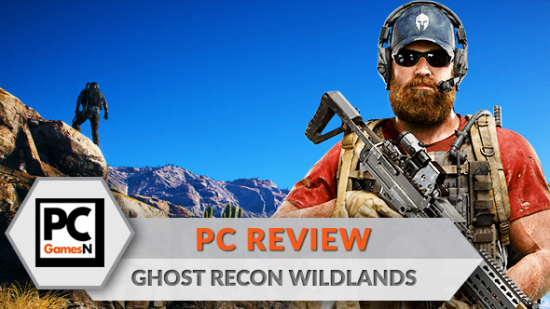Its predictable missions, boorish morals and awful jokes might suggest otherwise, but Ghost Recon Wildlands is not a thoughtless game. On the contrary, Ubisoft seem to have spent months researching the country of Bolivia, the jargon of the narcotics trade and how cocaine is cultivated. Talented environment artists and fluent systems designers have made the game look and play acceptably and there are occasional streaks of imagination – the Sync Shot, whereby you mark a series of enemies then hit fire to have your team silently execute them all at once, finally makes one of the eeriest spectacles from Call of Duty into something interactive.
Check out Ghost Recon Wildlands’ PC performance while you’re here.
Ghost Recon is not thoughtless, but it is a waste of time. The aforementioned research is visible only barely; for the sake of a simpler, less challenging story, the rest seems to have been thrown out. Likewise, the competent parts of the game are devoured by the majority. The people who worked on Wildlands clearly have ability, but given how the game’s myriad – and wholly avoidable – demerits overwhelm its better qualities, they have been misused. Wildlands isn’t stupid, cheap or striving to become better. It just doesn’t care if it’s wrong. Regardless of what it does or asks us to do, this game is impervious to good taste.
As the leader of the eponymous special forces group, sent to Bolivia to dismantle a drug cartel called Santa Blanca, you venture across 21 separate provinces, systematically assassinating high-ranking narcos and destroying their businesses. Each province contains six missions. Each mission is activated by collecting an intelligence file. Structurally, Wildlands is not dissimilar to 2016’s Mafia III. Slowly capturing parts of Bolivia away from the cartel is reminiscent of taking over New Bordeaux piece by piece and of course, you can approach each task in a variety of ways. If you use your skill points, unlocked by completing jobs or finding collectibles, to upgrade your guns, you might choose to go in with those guns blazing. If instead you choose to improve the abilities of your squadmates – all of whom are controlled using a refreshingly simply command radial when playing solo – you might want to take a more silent approach, scanning for targets with your remote-controlled drone and setting up Sync Shots.
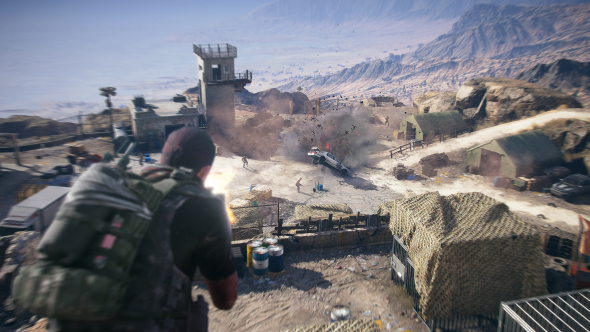
The plain mechanics of Ghost Recon Wildlands are largely inoffensive. It’s a dull, one-note experience, but not because moving, shooting and driving are unenjoyable in and of themselves; the difference between Wildlands and more successful attempts at the genre is how the latter provide us credible characters and a cogent story. Even the most rote open-world experience – go here, kill these, go somewhere else – can be made compelling, it seems, with good writing. Ghost Recon exemplifies the opposite. Without a competent narrative, the most reliably entertaining videogame systems – even when they’re refined by experienced craftspeople – will suffer. If you can find a way to play Wildlands without feeling like you’re both wasting your own time and capitulating to the worst excesses in modern videogames, then by all means, indulge yourself.
There are moments when, at least at a base level, Ghost Recon Wildlands starts to work. The Sync Shots really are a sight to behold – skilfully and silently executing targets, with unfair efficiency, is perfect interactive summary of the game’s narrative premise. Gunfights in general have a varied, spontaneous momentum. Compared to many of its contemporaries, even Far Cry, where enemies seem to be either completely ignorant of your presence or converging on you as one ultra-aggressive hive mind, Wildlands gradually builds the stakes and pacing of each incursion. If a narco gets suspicious, rather than his entire gang going into high alert, he might gather a few of his closest comrades to come looking for you, giving you another opportunity to hit a Sync Shot and continue incognito. If things do go loud, simply clearing out the enemies in front of you is rarely enough. Reinforcements arrive in cars. Helicopters swoop in for gun runs. If Ghost Recon wants us to feel like its recreation of Bolivia is on the brink of detonation and that our presence, should it be too heavy-handed, might push the whole country into all-out war, its gradually escalating firefights tell that story.
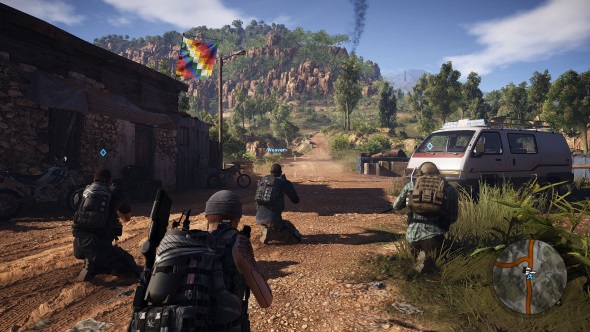
Case in point: a raid we stage against a hotel and casino in one of Bolivia’s central provinces. Here, everything good about Wildlands clicks into place. Scouting the building from afar and lining up Sync Shots one after another made us feel not just like we were taking down the cartel as intended, but smart, ruthless and efficient. If Ghost Recon elsewhere struggles to throw criticism the American characters’ way, silently and successively head-shotting dopey goons before they even notice they’re being watched does at least make the Ghost team appear appropriately frightening.
Storming the complex proper, we’re mindful, perhaps for the first time, not to wound civilians. As they scatter away from the casino floor and enemy gunmen start to take pot shots at us from a balcony above, Wildlands’ effortless shooting and order mechanics allow us to fight back with reassuring authority. Unscrewing our silencers for maximum weapon damage. Opening fire upon team-mate instruction. Running to an ammunition crate and swapping our sniper scopes for iron sights. The battle is still nerve-racking and loud, but all these little actions encourage us, once again, to actually care about what was going on. Without any on-screen prompts, Wildlands, in this moment and several others, impresses the importance of precision and careful management, not just of our team but our own equipment. It feels not only truer to the story, but like a more distinctive, more intelligent third-person shooter – if open-world games typically invite you to do whatever you like, in this moment at least, Ghost Recon asks you to think and be more careful.
However, for much of our time in Wildlands, we seem to operate with impunity – no matter what we do, how much carnage we spread, it is all consolidated and justified under the rubrics of western democracy and ‘doing the right thing’. The name, ‘Wildlands’ implies that Bolivia is an untamed, savage place, perhaps in need of civilising by military might. With that established, we are given freedom, more or less, to use the country and its resources in whatever way best suits our objective. We steal cars and face no consequences. Before being confronted by a mission failed screen, we may kill up to three civilians. Tear up the roads, smash through fences, explode bombs in the centre of a town. It’s all, as far as Ghost Recon is concerned, in the name of a righteous cause.
Another case in point: a small moment, but given how the rest of Wildlands plays out, my very first action in the game now feels telling. After the opening cutscenes are over and I’m handed control for the first time, I promptly jump in a car to drive over to an objective. En route, I briefly lose control and smash through a fence – it was my fault, but perfectly illustrative of a tension in Wildlands between what you’re supposed to feel like you’re doing and what you actually do. As an elite special forces unit, sent to identity and surgically dismantle the cartel, the first thing I do in Bolivia is destroy some poor citizen’s private property.
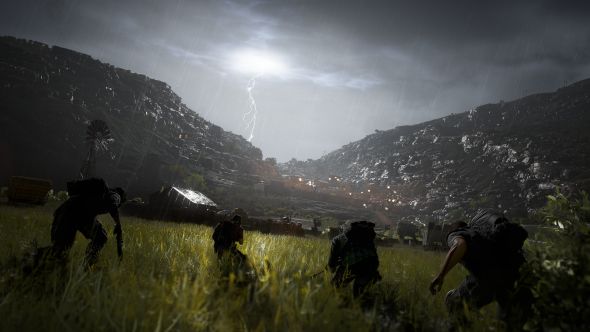
And when toward the game’s end the Bolivian rebel force, until this point ostensibly fighting against the cartel, turn out to be villainous also, Wildlands’ overarching insinuation (to call it a statement would credit the writers with too much conviction) becomes clear: foreigners are untrustworthy and we can’t rely on developing nations to govern themselves. In 2017, after so many videogames doing and saying these things, if it’s not outright odious it’s at least boring.
Considering the popular understanding of drug cartels – largely accrued through films and television, but still – it’s surprising how bullish and inconsiderate Wildlands feels. Perhaps if the dialogue weren’t so inane (when you get into a gunfight your character will exclaim “Sh*tballs!”; when you spy on a local power player having sex, a team-mate chortles that he wants to go down there and join in) it’d be easier to respect the game’s broad moral strokes. But despite the Bolivian landscape, which seems based on robust research, Wildlands’ story feels like the work of a team that doesn’t know – and never cared to know – its subject matter. When you repeatedly hear words like ‘sicario’ and ‘narcos’ being dropped throughout, you can’t help but suspect Wildlands is only interested in the drug trade because, thanks to the movie Sicario and the TV show Narcos, it is currently in vogue. Real life cartels do provoke an uncompromising military response, and perhaps are despicable. But Ghost Recon doesn’t sell that to us. It’s a craven appeal to popularity, which tries to disguise its disinterest in honesty, truth or sincerity behind bad jokes.
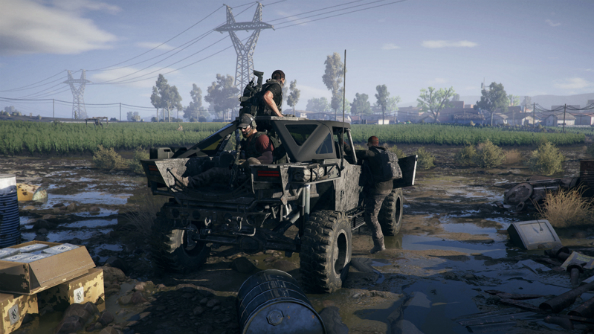
Once again, it just feels like an unfortunate waste. Wildlands, evidently, has been created by some talented people. Play it with a friend, or friends, in cooperative mode and you can talk over the dialogue and ignore the story – then, the game starts to feel like something anyone could enjoy. Ultimately, however, Wildlands is a dispassionate, self-defeating experience. If sandbox games, particularly from Ubisoft, have proceeded in kind for the past eight or so years – arguably following the success of Assassin’s Creed II – Ghost Recon feels like the end of an era, or at least what ought to be the end of an era.
This particular take on the open-world genre, defined by quantity over quality, plainness over intrigue, has been exhausted. And Ubisoft are capable of better: Watch Dogs 2 played not unlike Wildlands, but had heart, conscience and a thorough understanding of the world it depicted, and so remains one of the most surprising games of last year. With that in mind, and when you simply stand and look around Ghost Recon Wildlands, it’s hard to understand how so much talent, time and money can result in something so arid. One can only hope that Ubisoft – or maybe triple-A development in general – understands next time to better allocate their considerable resources.
